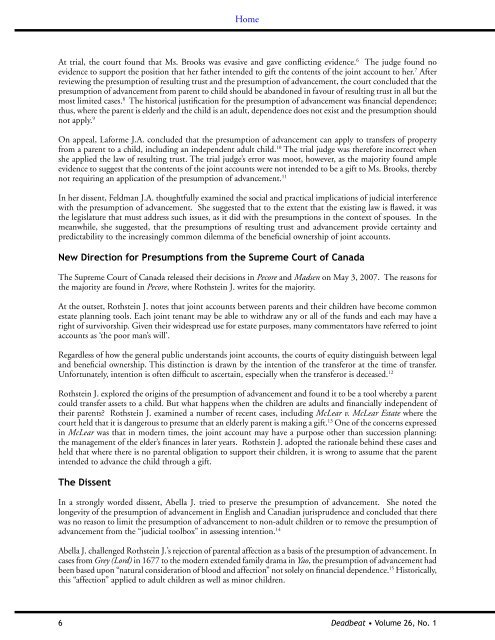Deadbeat - Goodmans
Deadbeat - Goodmans
Deadbeat - Goodmans
Create successful ePaper yourself
Turn your PDF publications into a flip-book with our unique Google optimized e-Paper software.
Home<br />
At trial, the court found that Ms. Brooks was evasive and gave conflicting evidence. 6 The judge found no<br />
evidence to support the position that her father intended to gift the contents of the joint account to her. 7 After<br />
reviewing the presumption of resulting trust and the presumption of advancement, the court concluded that the<br />
presumption of advancement from parent to child should be abandoned in favour of resulting trust in all but the<br />
most limited cases. 8 The historical justification for the presumption of advancement was financial dependence;<br />
thus, where the parent is elderly and the child is an adult, dependence does not exist and the presumption should<br />
not apply. 9<br />
On appeal, Laforme J.A. concluded that the presumption of advancement can apply to transfers of property<br />
from a parent to a child, including an independent adult child. 10 The trial judge was therefore incorrect when<br />
she applied the law of resulting trust. The trial judge’s error was moot, however, as the majority found ample<br />
evidence to suggest that the contents of the joint accounts were not intended to be a gift to Ms. Brooks, thereby<br />
not requiring an application of the presumption of advancement. 11<br />
In her dissent, Feldman J.A. thoughtfully examined the social and practical implications of judicial interference<br />
with the presumption of advancement. She suggested that to the extent that the existing law is flawed, it was<br />
the legislature that must address such issues, as it did with the presumptions in the context of spouses. In the<br />
meanwhile, she suggested, that the presumptions of resulting trust and advancement provide certainty and<br />
predictability to the increasingly common dilemma of the beneficial ownership of joint accounts.<br />
New Direction for Presumptions from the Supreme Court of Canada<br />
The Supreme Court of Canada released their decisions in Pecore and Madsen on May 3, 2007. The reasons for<br />
the majority are found in Pecore, where Rothstein J. writes for the majority.<br />
At the outset, Rothstein J. notes that joint accounts between parents and their children have become common<br />
estate planning tools. Each joint tenant may be able to withdraw any or all of the funds and each may have a<br />
right of survivorship. Given their widespread use for estate purposes, many commentators have referred to joint<br />
accounts as ‘the poor man’s will’.<br />
Regardless of how the general public understands joint accounts, the courts of equity distinguish between legal<br />
and beneficial ownership. This distinction is drawn by the intention of the transferor at the time of transfer.<br />
Unfortunately, intention is often difficult to ascertain, especially when the transferor is deceased. 12<br />
Rothstein J. explored the origins of the presumption of advancement and found it to be a tool whereby a parent<br />
could transfer assets to a child. But what happens when the children are adults and financially independent of<br />
their parents? Rothstein J. examined a number of recent cases, including McLear v. McLear Estate where the<br />
court held that it is dangerous to presume that an elderly parent is making a gift. 13 One of the concerns expressed<br />
in McLear was that in modern times, the joint account may have a purpose other than succession planning:<br />
the management of the elder’s finances in later years. Rothstein J. adopted the rationale behind these cases and<br />
held that where there is no parental obligation to support their children, it is wrong to assume that the parent<br />
intended to advance the child through a gift.<br />
The Dissent<br />
In a strongly worded dissent, Abella J. tried to preserve the presumption of advancement. She noted the<br />
longevity of the presumption of advancement in English and Canadian jurisprudence and concluded that there<br />
was no reason to limit the presumption of advancement to non-adult children or to remove the presumption of<br />
advancement from the “judicial toolbox” in assessing intention. 14<br />
Abella J. challenged Rothstein J.’s rejection of parental affection as a basis of the presumption of advancement. In<br />
cases from Grey (Lord) in 1677 to the modern extended family drama in Yao, the presumption of advancement had<br />
been based upon “natural consideration of blood and affection” not solely on financial dependence. 15 Historically,<br />
this “affection” applied to adult children as well as minor children.<br />
6 <strong>Deadbeat</strong> • Volume 26, No. 1
















